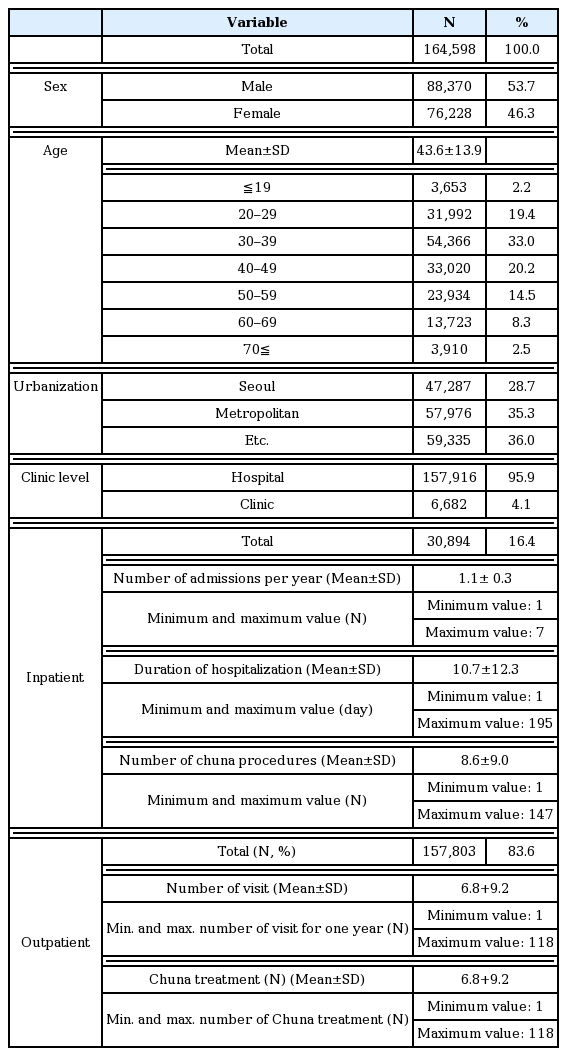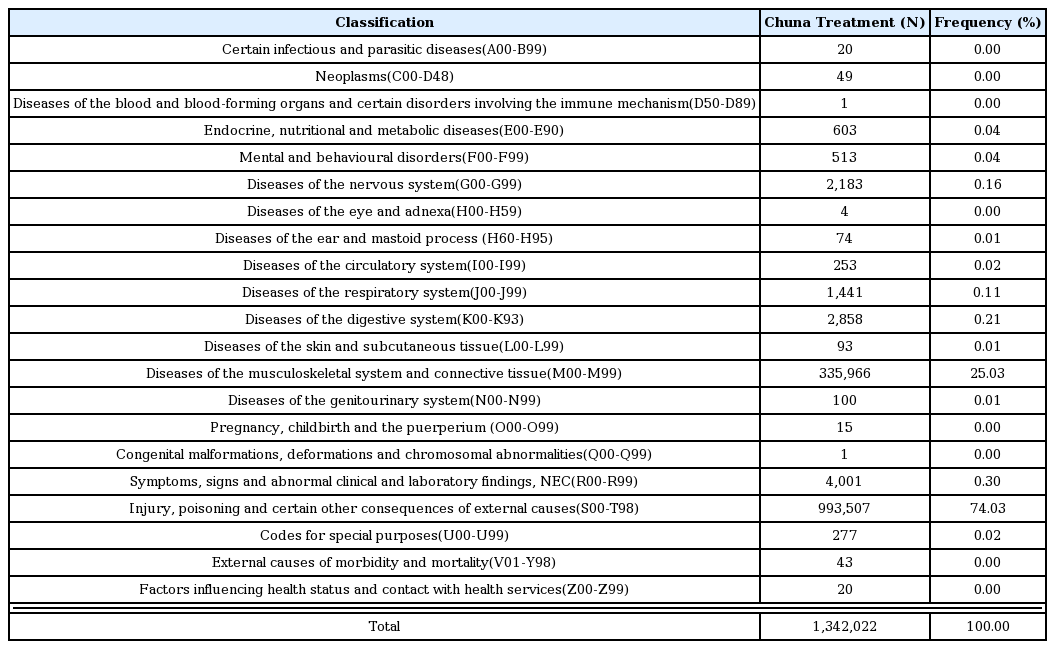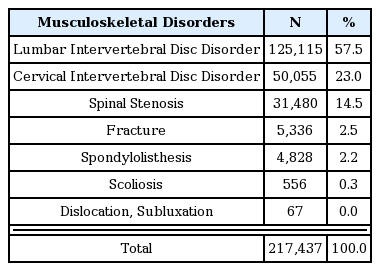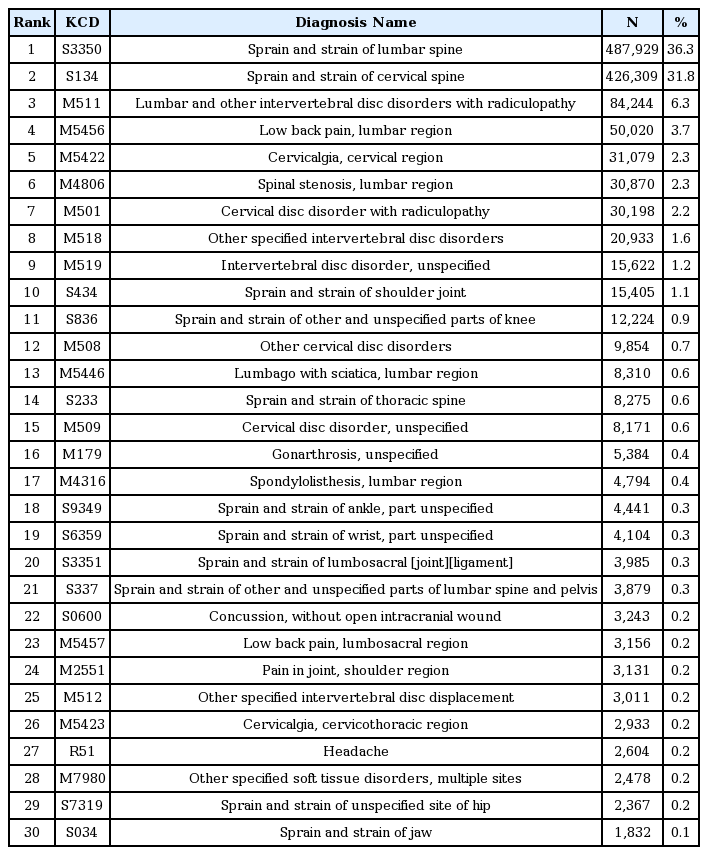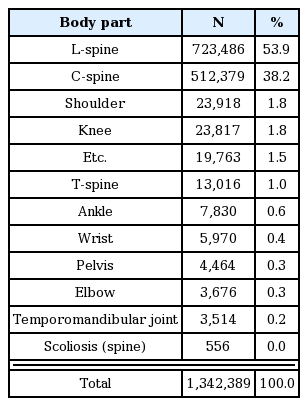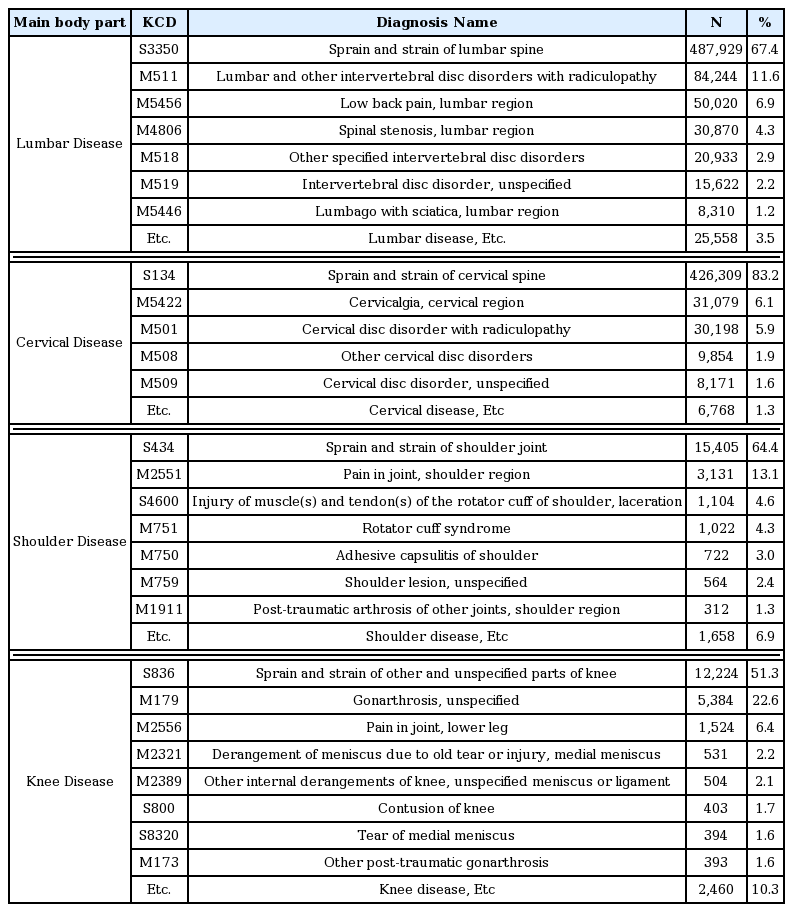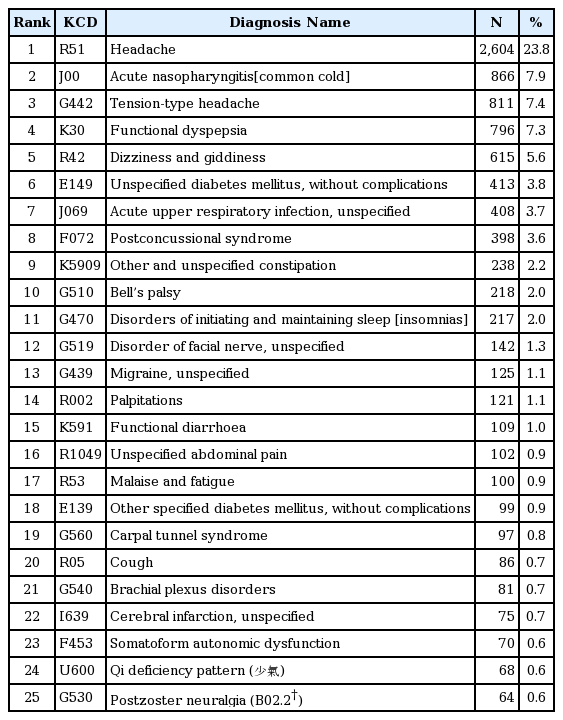References
2. Yun JH, Kang JM, Kim KS, Kim SH, Kim TH, Park YW, et al. Health-related quality of life in Korean patients with chronic diseases. The Journal of the Korean Rheumatism Association 2004;11(3):263–74.
4. Korea sosciety of chuna menual medicine for spine & nerves. Chuna manual medicine 2nd ed. Seoul: Korea sosciety of chuna menual medicine for spine & nerves; 2015. 4p. 46–50.
5. Oliphant D. Safety of spinal manipulation in the treatment of lumbar disk herniations: a systematic review and risk assessment. Journal of Manipulative and Physiological Therapeutics 2004;27(3):197–210.
6. Jeong SY, Lee CR. Research about Adverse Effect of Spinal Manipulation Therapy : Systemic Review of Literature in Korea and Pubmed. The Journal of Korea CHUNA Manual Medicine for Spine & Nerves 2015;10(1):15–33.
7. Lee KB, Ha IH, Kim HS, Bae YH, Kim NH, Seo CY, et al. Chuna Manual Therapy for Neck Pain : A Systematic Review and Meta-analysis. The Journal of Korea CHUNA Manual Medicine for Spine & Nerves 2016;11:11–21.
8. Moon TW, Choi TY, Park TY, Lee MS. Chuna therapy for musculoskeletal pain: a systematic review of randomized clinical trials in Korean literature. Chinese journal of integrative medicine 2013;19(3):228–32.
9. Jeong B, Chung SH, Lee JS. Magnetic Resonance Imaging Follow-Up Study on the Case of Protruded Lumbar Intervertebral Disc Herniation through Chuna Therapy. The Journal of Oriental Rehabilitation Medicine 2006;16(3):149–57.
10. Lee SM, Choi YS, Park YH, Keum DH. Chuna Treatment Cases Report on Neck Pain Patients with Abnormal Cervical curvature. The Journal of Oriental Rehabilitation Medicine 2002;12(4):154–62.
11. Shin SH, Han KI, Jeon YT, Ko YS, Lee JH. Systematic Review of Chuna Manual Therapy for Cervicogenic Headache. The Journal of Korea CHUNA Manual Medicine for Spine & Nerves 2017;12(1):1–12.
12. Lee NW, Kim GH, Heo I, Kim KW, Ha IH, Lee JH, et al. Chuna (or Tuina) Manual Therapy for Musculoskeletal Disorders: A Systematic Review and Meta-Analysis of Randomized Controlled Trials. Evidence-Based Complementary and Alternative Medicine 2017;2017
14. Hwang MS, Cho HW, Lee HY, Heo KH, Hwang EH, Shin MS, et al. Research Trends on Chuna Treatment in Korean Medicine - Focused on Type of Clinical Trails. The Journal of Korea CHUNA Manual Medicine for Spine & Nerves 2013;8:49–61.
15. Byun GJ, Hong HS, Kim YK. Factors Associated with Health Behaviors and Musculoskeletal Disease among Adults. Journal of Korean Biological Nursing Science 2011;13(3):262–8.
16. Seo CH. Mental Health Promotion in the Workplace 1st ed. Ulsan: Korea Occupational Safety and Health Agency(KOSHA); 2017. p. 5.
17. Kim KS, Park JK, Kim DS. Status and Characteristics of Occurrence of Work-related Musculoskeletal Disorders. Journal of the Ergonomics Society of Korea 2010;29(4):405–22.
18. Jeong BY. Ergonomics’ Role for Preventing Musculoskeletal Disorders. Journal of the Ergonomics Society of Korea 2010;29(4):393–404.
19. Korea Institute of Oriental Medicine. 2016 Yearbook of Traditional Korean Medicine 1st ed. Daejeon: Shnjin planing company; 2018. p. 250.
20. Park WW. Image Study of the Thoracolumbar Spine Fracture. Journal of Korean Society of Spine Surgery 2001;8(3):401–12.
21. Ha JJ, Kim DH, Lee JH, Lee K, Kwon HP, Kwon JH, et al. Facet joint injuries in acute cervical spine trauma: evaluation with CT and MRI. Journal of the Korean Radiological Society 1999;40(5):957–63.
22. Choo JS, Lim HH. The Study of Oriental Medical Literature Review on JEONG-GOL Chuna. The Journal of Korea CHUNA Manual Medicine 2001;2(1):5–12.
23. Yun JT, Lim HH. The Study of Oriental Medical Literature Review on KYUNGKUEN Chuna. The Journal of Korea CHUNA Manual Medicine 2001;2(1):13–25.
24. Lim KT, Hwang EH, Kim BJ, Park IH, Heo I. Manual Therapy for Essential Hypertension: A Systematic Review. The Journal of Korea CHUNA manual medicine for spine & nerves 2017;12(1):29–42.
25. Hwang MS. Chuna Manual Therapy for Primary Insomnia; A Review of Clinical Study. Journal of Korean Medicine Rehabilitation 2016;26(3):79–84.
26. Lee NW, Kim GH, Shin BC. Chuna Manual Therapy for Chronic gastritis : A Systematic Review. The Journal of Korea CHUNA Manual Medicine for Spine & Nerves 2017;12(2):1–14.
27. Seo HR, Lee HY, Hwang MS. Chuna Manual Therapy for Irritable Bowel Syndrome; A Systematic Review. The Journal of Korea CHUNA Manual Medicine for Spine & Nerves 2016;11(2):1–9.
28. Seo HR, Li YC, Lee JE, Lim MK. Chuna Manual Therapy for Primary Dysmenorrhea: A Systematic Review. Journal of Korean Medicine Rehabilitation 2017;27(3):81–93.
29. Park JM, Shin SW, Park JH. A comparative study on the concepts of the Chuna (推拿). Journal of Oriental Medical Classics 2008;21(2):173–91.
30. Kang MS, Kim CH. Management of diabetic peripheral neuropathy. The Korean Journal of Medicine 2015;89(3):277–81.

